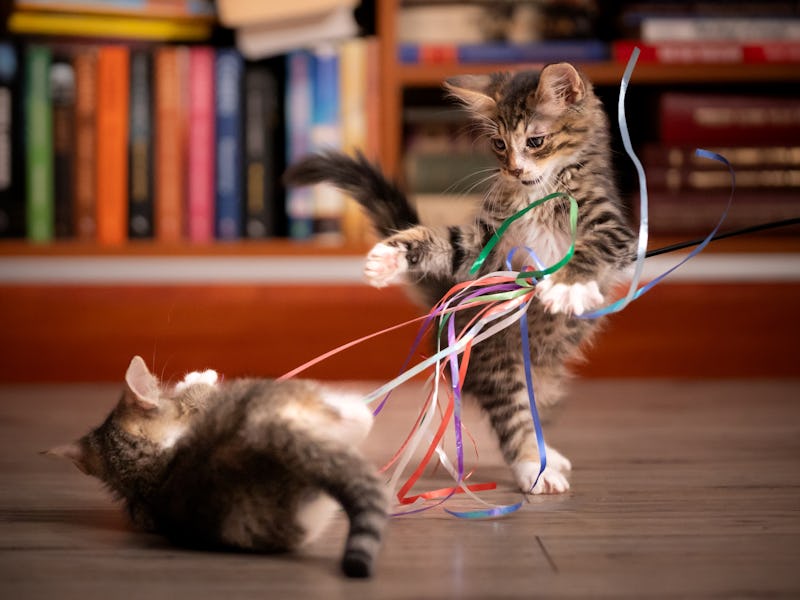Why Does My Cat Eat Plastic? Veterinarians Reveal The Surprisingly Simple Answer
Keeping loose plastic out of your pet’s reach is vital.

For all the tasty kibble, pâtés, treats, and home-cooked meals you offer your pets, sometimes they still gobble up strange non-food items. But perhaps nothing is as bizarre as a cat’s obsession with plastic. Whether it's ribbons or bandaid ends, even the most well-fed cats seem to jump at the chance to chow down on plastic. It turns out there is a reason for this odd behavior.
The general term for eating an item that isn’t food is called pica (PIE-ca). Anyone — not just our pets — can have this condition, but pica can be especially dangerous to pets because it may cause a life-threatening intestine or bowel obstruction. Molly DeVoss, a cat behavior specialist, tells Inverse that she doesn’t know of any particular chemical compound that cats and dogs might be attracted to.
Scientists also don’t know what causes pica, but a few theories explain why animals might have it. DeVoss points to pica as an antidote for discomfort, similar to a teething baby. She says it could also stem from a nutrient deficiency. If our furry friends lack certain nutrients, they might feel the impulse to chew certain things in an attempt to acquire those nutrients. A trip to the vet could address both of these issues.
They could also be trying to get our attention out of boredom or anxiety. It’s common, DeVoss tells Inverse, for domestic cats — like house cats — to get bored. Eating plastic might be a quick fix for novelty or distraction.
To prevent this, DeVoss recommends keeping loose plastic out of your pet’s reach, of course, but she says it is also imperative to address any potential boredom and anxiety. Toys are a crucial, if obvious, remedy. Food-seeking puzzles also boost cat and dog brain activity as they problem-solve in pursuit of a treat. DeVoss also advocates leaving on music or TV if your pet will be alone for hours. She implores pet owners to question whether they’re “just coexisting and not interacting” with their beloved critters. Meaningful interactions can “help them feel more satisfied with their environment,” decreasing boredom and anxiety.
By extension, bored or anxious pets might try to get a rise out of their owner with attention-seeking behavior, like eating something forbidden. “‘Mom's not paying attention to me,’” DeVoss says, anthropomorphizing a pet. “‘As soon as I chew on this plastic, she comes over and takes it away and talks to me, so I'm gonna do it a lot.’” She says one way to discern anxiety from the desire for attention is when the behavior occurs. “If it's attention-seeking behavior, it happens when you're home, and it doesn't happen when you're not home,” she tells Inverse. Cameras can help with that question.
DeVoss cautions pet owners to pay attention to how they respond to their pets’ attention-seeking behaviors. Owners don’t want to send the wrong message by rewarding undesirable behaviors instead of good ones, she adds. She recommends leaving chew toys that keep your pet occupied and clean their teeth. This way, they have another outlet for their chewing behavior once all the plastic is out of reach.
Sometimes, the reason for plastic snacking is simpler than psychological well-being: If the coveted plastic once wrapped in some kind of meat, your pet might just be trying to lap up residual morsels.
If your pet does ingest some plastic, DeVoss recommends becoming a stool vigilante. When she finds her cat has eaten his treats along with their bright pink packaging, she’s “always scared half to death and watching to make sure that [she’s] seeing pink in the poo.” Once the plastic resurfaces in your pet’s stool, you can be certain it’s not causing any blockages. If your pet has eaten plastic and hasn’t pooped for 48 hours, it’s time to go to the vet in case there’s an obstruction.
Luckily, eliminating your pet’s plastic intake can be fairly simple. We love our smooth-brained babies, and sometimes that means protecting them from themselves.
This article was originally published on